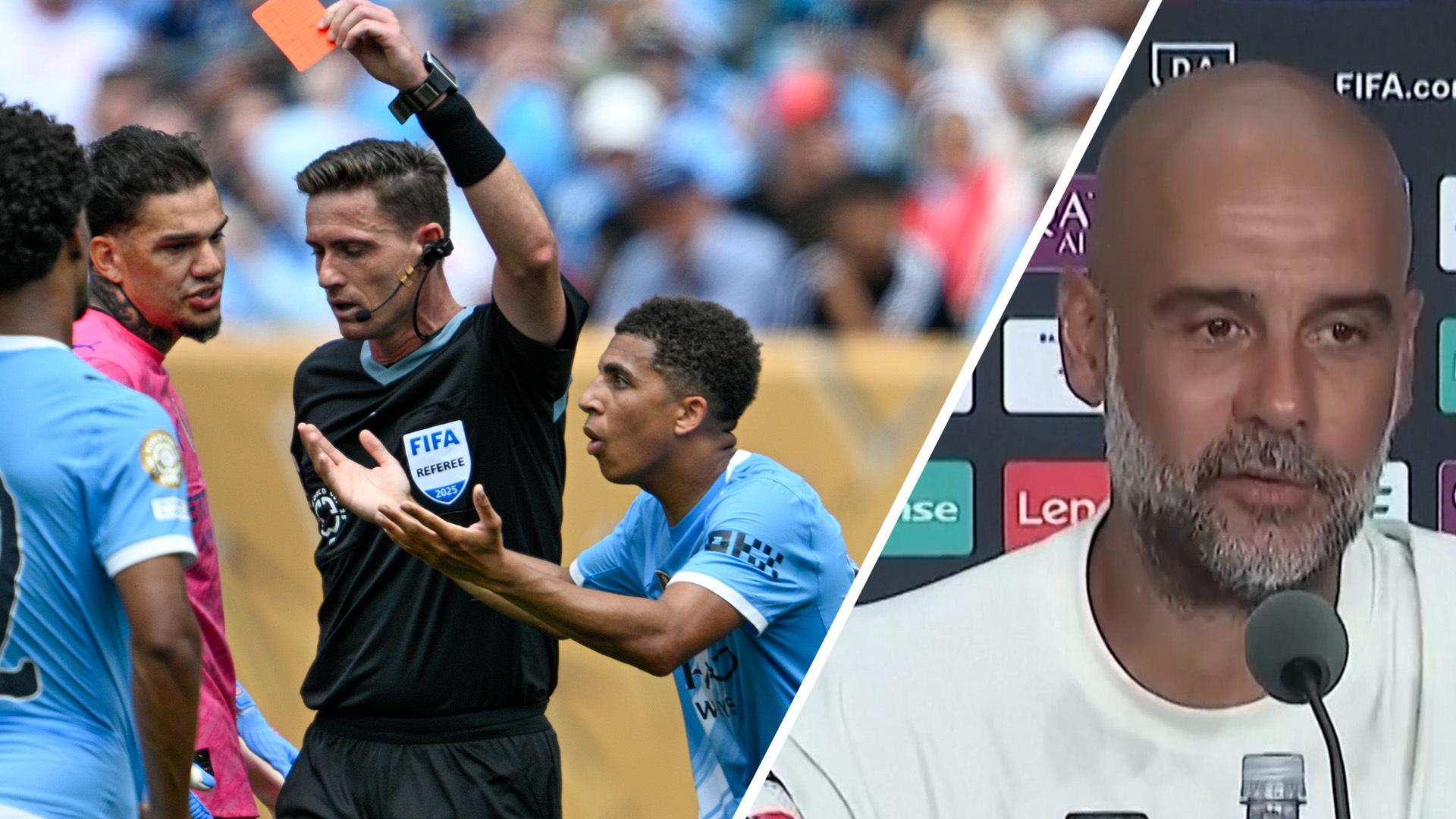Lewis red card was unnecessary, says Pep

The FIFA Club World Cup 2025 commenced with Manchester City delivering a commanding 2-0 victory over Wydad AC at the Lincoln Financial Field in Philadelphia, but the triumph was overshadowed by a controversial red card decision that left manager Pep Guardiola visibly frustrated. The match, which marked City’s Group G opener, showcased the club’s attacking prowess through goals from Phil Foden and Jeremy Doku, yet the late dismissal of Rico Lewis became the defining talking point of an otherwise impressive performance.
A Dominant Display in Philadelphia
Manchester City approached their Club World Cup debut with the tactical sophistication and clinical efficiency that has become synonymous with Guardiola’s reign. The Lincoln Financial Field, typically home to American football’s Philadelphia Eagles, was transformed into a theater of international football excellence, witnessing City’s methodical dismantling of the Moroccan champions Wydad AC.
From the opening whistle, City established their dominance through patient build-up play and intelligent movement off the ball. The Citizens’ approach was characteristically measured, with their possession-based philosophy immediately evident as they sought to control the tempo and dictate the flow of the match. Wydad AC, while organized defensively, found themselves consistently pressed back into their own half, struggling to maintain possession against City’s relentless pressing and superior technical ability.
The tactical setup employed by Guardiola reflected his understanding of the opposition’s strengths and weaknesses. City’s formation allowed for fluid movement between the lines, with midfield maestros orchestrating play while the forward line remained constantly threatening. This systematic approach to breaking down defensive structures has been a hallmark of Guardiola’s tenure, and it was on full display against Wydad AC.
Foden’s Moment of Magic
Phil Foden’s opening goal exemplified the quality that has made him indispensable to City’s success. The England international’s ability to find space in crowded areas and deliver clinical finishes has been a consistent feature of his development under Guardiola’s tutelage. His strike against Wydad AC was a testament to his growing maturity as a player and his understanding of the subtle movements required to unlock stubborn defenses.
The goal itself was a product of City’s collective intelligence, with intricate passing sequences creating the opportunity for Foden to capitalize. His positioning and timing were impeccable, demonstrating the tactical awareness that Guardiola has instilled in his squad. The celebration that followed reflected not just personal satisfaction but the collective joy of a team executing their game plan to perfection.
Foden’s contribution extended beyond his goal, as he consistently provided creative impetus throughout the match. His ability to drift between the lines, create numerical advantages, and link play between midfield and attack was crucial in City’s dominance. The young midfielder’s performance reinforced his status as one of the most promising talents in world football and a key component of City’s future aspirations.
Doku’s Explosive Impact
Jeremy Doku’s goal provided the perfect complement to Foden’s opener, showcasing a different dimension of City’s attacking arsenal. The Belgian winger’s explosive pace and direct running have added a new dynamic to City’s forward play since his arrival. His ability to beat defenders in one-on-one situations and create scoring opportunities from seemingly nothing has been a valuable asset for Guardiola’s tactical system.
The goal demonstrated Doku’s growing understanding of City’s attacking patterns and his ability to make intelligent runs at the right moments. His finish was composed and clinical, reflecting the confidence that comes from playing in a system that maximizes his natural abilities. The Belgian’s integration into City’s squad has been seamless, with his pace and directness providing the perfect counterbalance to the team’s more patient build-up play.
Doku’s performance against Wydad AC highlighted his potential to become a key player in City’s pursuit of multiple trophies. His ability to stretch defenses and create space for teammates has been evident throughout his time at the club, and his goal against Wydad AC was a perfect example of how individual brilliance can complement collective tactical excellence.
The Controversial Red Card Decision
The match’s defining moment came in the 88th minute when Rico Lewis was shown a straight red card by Brazilian referee Ramon Abatti. The decision sparked immediate controversy and left Guardiola questioning the officiating standards at the highest level of international football. Lewis, who had been performing admirably throughout the match, found himself dismissed for what appeared to be an accidental collision with Wydad substitute Samuel Obeng.
The incident occurred during what seemed to be a routine defensive action, with Lewis winning the ball cleanly before his follow-through caught Obeng in the face. The former Academy player’s tackle was executed with no apparent malicious intent, making the referee’s decision to show a straight red card all the more controversial. The speed of the game and the natural momentum of the challenge appeared to contribute to the unfortunate contact, yet the officials deemed it worthy of immediate dismissal.
The involvement of VAR in upholding the decision added another layer of complexity to the controversy. Video Assistant Referee technology was implemented to provide clarity in such situations, yet its confirmation of the red card only intensified the debate surrounding the decision. The technology, while designed to eliminate clear errors, seemed to support a judgment that many observers found harsh and inconsistent with the nature of the challenge.
Guardiola’s Measured Response
Pep Guardiola’s post-match comments reflected his frustration while maintaining the dignity and professionalism that has characterized his managerial career. His analysis of the incident was both technical and emotional, demonstrating his protective instincts toward his players while acknowledging the authority of match officials. The City manager’s description of the tackle as having “no malice” was particularly telling, as it highlighted his belief that Lewis had been unfairly punished for what was essentially an accident of timing and momentum.
“The leg was high but he was on the grass,” Guardiola explained, providing a tactical analysis of the challenge that emphasized Lewis’s legitimate attempt to win the ball. His observation that “to touch the ball, the leg has to be a little bit higher” demonstrated his understanding of the mechanical aspects of defending and the split-second decisions that players must make in high-pressure situations.
The manager’s acknowledgment that “the ref had a different opinion, he’s the boss” showed his respect for the officiating process while maintaining his disagreement with the decision. This diplomatic approach has been characteristic of Guardiola’s handling of controversial decisions throughout his career, balancing his role as a protector of his players with his responsibility to maintain professional standards.
Lewis’s Development and Future Prospects
Rico Lewis’s red card was particularly unfortunate given his impressive development trajectory at Manchester City. The young defender, who progressed through the club’s renowned Academy system, has been viewed as a symbol of City’s commitment to developing homegrown talent. His performances have consistently impressed observers, with his technical ability and tactical intelligence marking him as a player with significant potential.
The red card incident should not overshadow Lewis’s overall contribution to the match or his broader development as a player. His ability to play multiple positions and adapt to different tactical requirements has made him a valuable squad member for Guardiola. The manager’s public defense of the player following the controversial decision demonstrates the trust and confidence that the coaching staff has in Lewis’s character and ability.
Lewis’s response to this setback will be crucial in determining his future development. The ability to bounce back from controversial decisions and maintain focus on continuous improvement is often what separates good players from great ones. His youth and the support of his manager and teammates provide a strong foundation for overcoming this disappointment and continuing his upward trajectory.
The Broader Context of the Club World Cup
Manchester City’s participation in the FIFA Club World Cup 2025 represents the culmination of years of sustained excellence and strategic planning. The tournament, which brings together the world’s best club teams, provides an opportunity for City to demonstrate their quality on a global stage. Their opening victory over Wydad AC, despite the late controversy, was a statement of intent and a demonstration of their ambitions for the competition.
The Club World Cup format allows for fascinating tactical battles between teams from different footballing cultures and playing styles. City’s approach to the tournament reflects their systematic preparation and adaptability, qualities that have served them well in domestic and European competitions. The victory over Wydad AC showcased their ability to adjust to different opponents while maintaining their core tactical principles.
The tournament also provides valuable experience for City’s younger players, including Rico Lewis, who despite his red card, gained important exposure to high-level international competition. These experiences are crucial for the development of future stars and the continuation of City’s success across multiple competitions.
Tactical Analysis and Strategic Implications
From a tactical perspective, City’s performance against Wydad AC revealed several interesting aspects of Guardiola’s strategic thinking. The team’s ability to control possession while remaining threatening in the final third demonstrated the balance that the manager has achieved between defensive solidity and attacking creativity. The positioning of players and the timing of their movements showed the hours of preparation and tactical drilling that have become synonymous with Guardiola’s methods.
The use of Foden and Doku in advanced positions allowed City to exploit the spaces behind Wydad’s defensive line, while the midfield provided the platform for sustained attacking pressure. This tactical approach has been refined over years of working together, and its effectiveness was evident in the comprehensive nature of the victory.
The red card incident, while unfortunate, also provided insights into the challenges of modern officiating and the impact of technology on decision-making. The speed of the game and the split-second nature of many challenges make officiating increasingly difficult, yet the consistency of decisions remains crucial for maintaining the integrity of the sport.
Looking Forward: City’s Club World Cup Ambitions
Manchester City’s victory over Wydad AC serves as the perfect launchpad for their Club World Cup campaign. The performance demonstrated that they possess the quality and tactical sophistication necessary to compete at the highest level of international club football. The goals from Foden and Doku showcased different aspects of their attacking arsenal, while the overall team performance highlighted their collective strength.
The red card controversy, while disappointing, should not detract from the positive aspects of the performance. City’s ability to maintain their composure and secure the victory despite the late dismissal demonstrates the mental strength and resilience that championship teams require. These qualities will be crucial as they progress through the tournament and face increasingly challenging opponents.
The experience gained from this opening match will be invaluable as City continues their pursuit of Club World Cup glory. The combination of individual brilliance and collective tactical excellence that characterized their performance against Wydad AC provides a template for success in the remaining matches. With Guardiola’s tactical acumen and the squad’s proven ability to perform under pressure, City appears well-positioned to make a significant impact in the tournament.
Conclusion: A Statement of Intent
Manchester City’s 2-0 victory over Wydad AC in their FIFA Club World Cup opener was more than just three points; it was a statement of their ambitions and capabilities on the global stage. Despite the controversy surrounding Rico Lewis’s red card, the performance demonstrated the quality and tactical sophistication that has made City one of the world’s premier football clubs.
The goals from Phil Foden and Jeremy Doku showcased the depth of talent at Guardiola’s disposal, while the overall team performance highlighted the systematic approach that has brought sustained success. The manager’s handling of the red card controversy demonstrated his protective instincts toward his players while maintaining professional standards.
As City progresses through the Club World Cup, they will carry the confidence gained from this opening victory while learning from the challenges encountered. The combination of individual excellence and collective tactical intelligence that characterized their performance against Wydad AC provides a strong foundation for continued success in the tournament. The controversial red card, while unfortunate, should not overshadow what was ultimately a convincing demonstration of City’s quality and ambition on football’s biggest stage.















